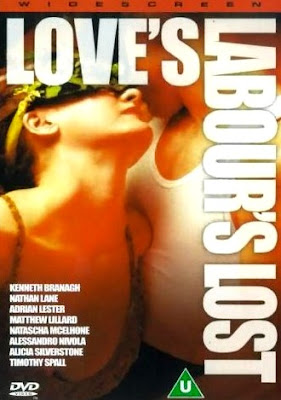Dancing With Shakespeare!
"Dancing With Shakespeare" is the direct translation of the title this film was given in Norway, and it is quite an apt description not only of the film’s content, but the fundamental, gnawing weakness of the film: a play that above all plays with language seems ill at ease in a jacket marked ”dancing”. When you dance with Shakespeare you don’t want to get out of step, and Love’s Labour’s Lost doesn’t quite come together. And it’s very sad because it’s a film you so much want to work, because its heart is in the right place, and its intentions are good and creative and exciting and bold. Yes, it’s enjoyable and frothy, silly and sincere in equal measures, beautifully shot with a camera that plays a part in the best Hollywood-golden-age manner, and sometimes it’s very funny and works beautifully. But frequently the novelty of turning one of Shakespeare’s most language-reliant comedies into a nostalgic romantic musical simply works against itself, and the result is then flat rather than uplifting. And this is not because people don’t try –everyone involved in the film really gives it a good go, and clearly wants to try to make it come off. It very nearly does, but not quite –there is an unevenness about it that keeps us from getting fully engrossed in what we see, and this is the sort of film that needs that to work.
I was lucky enough to see this film originally at a special screening introduced by Kenneth Branagh and Alicia Silverstone, which boosted the preview audience into a higher gear of excitement and expectation than would be usual, so the experience was a little like the prospect of drinking lots of champagne –delightful, but somehow never as good as the idea of it!
Upon re-watching the film recently, I think the film in fact rather more resembles one of those very fancy, colourful cocktails you order when on holiday, with tiny umbrellas and exotic fruit and flowers sticking out and looking enormously tempting on the menu and when brought to you, but always somewhat impractical to drink and with ingredients that don’t quite mix together satisfyingly enough. With Love’s Labour’s Lost the conceit of transforming Shakespeare’s rich ideas into classic Hollywood musical numbers to bring across certain moods and emotional moments is a fun recipe, but it seems to me to clash too often with the actual text the film is based on. Now, admittedly much of Shakespeare’s play is very obscure and difficult to understand compared to other plays he wrote, and severe editing was going to be inevitable; but putting in musical number after musical number as a replacement seems more a way of padding the film to arrive at a decent length rather than really moving the story along. In fact, many of the musical numbers –skillfully and cheekily staged though some of them are– just get in the way of things, and frequently I found myself wishing that Branagh had been even more faithful to Shakespeare and instead kept in more of the actual play itself. Thus I was pleasantly surprised to find a number of deleted scenes on the DVD of the film that sadly never made it to the final cut. I think these should have been kept in because they help make more sense of the story.
The diversity of performers that comprise the cast is quite interesting and there are some magnificent individual performances, though again the range of different styles doesn’t always gel on screen. To a certain extent this was also true of Branagh’s Much Ado About Nothing and Hamlet. Everyone is doing their own little film, and sometimes it works, sometimes it doesn’t. Timothy Spall’s Don Armado is perhaps one of the most outrageous performances ever seen on screen, but it is totally in keeping with the character as written. And both he and Nathan Lane (as Costard the clown) bring an essential element of sadness to their otherwise comic roles that is very moving. But the double quartet of lovers that form the central romantic story of the film is a very mixed bag indeed. Branagh understandably gives the plum role of Berowne to himself and sells his Shakespeare with that admirable deftness that is uniquely his, but he is really too old for the part and this works against him here. I also feel at times he should have directed himself more astutely or had better assistance at doing so, for it is largely the scenes in which he does not appear that work best –simply because at such times he, as director, is able to concentrate fully on the other performances. The film also seems unable to break itself totally free from its stageiness to become the truly filmic musical it aspires to be.
So, I am quite ambivalent about this film. I DO like and enjoy it, and applaud Branagh for tackling a lesser-known Shakespeare comedy, and with such gusto, but I SO wish I were able to like it more and be fully satisfied by it –and by the greater film that is in its heart..
Love’s Labour’s Lost (2000)
Director: Kenneth Branagh
With: Kenneth Branagh, Timothy Spall, Alicia Silverstone, Nathan Lane, Matthew Lillard, Geraldine McEwan, Richard Briers, Alessandro Nivola. Adrian Lester


No comments:
Post a Comment